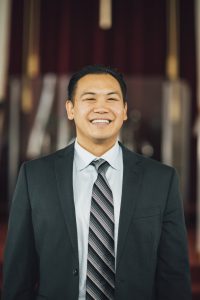Three Questions is a semi-regular series where we introduce individuals across the NAB with the same questions: What’s your story? What’s ministry like for you? What are you learning? This week, we hear from Kevin Wong, pastor of Cornerstone Trinity Baptist Church in San Francisco, California.
What’s your story?
 I am a pastor in San Francisco and a child of a Chinese immigrant father. My mother was born in San Francisco, California, and grew up in Chinatown. I have never left this region for all my education and young adult years and remained here to raise my family while many others have moved from here. I became a Christian in high school when a youth leader explained to me the parable of the prodigal son. I found, in this parable, my own story with God, as it resonated with my personal view of God. I had previously viewed God as strict and asking for compliance, while I viewed myself as independent and in no need of God. Through the prodigal son parable, God changed my view of myself and of him.
I am a pastor in San Francisco and a child of a Chinese immigrant father. My mother was born in San Francisco, California, and grew up in Chinatown. I have never left this region for all my education and young adult years and remained here to raise my family while many others have moved from here. I became a Christian in high school when a youth leader explained to me the parable of the prodigal son. I found, in this parable, my own story with God, as it resonated with my personal view of God. I had previously viewed God as strict and asking for compliance, while I viewed myself as independent and in no need of God. Through the prodigal son parable, God changed my view of myself and of him.
What’s ministry like for you?
I serve as senior pastor at Cornerstone Trinity Baptist Church in San Francisco. We are a predominantly Asian American church with many native San Franciscans trying to grow in our missional practices – viewing ourselves as sojourners in a region with many sojourners and others who are transplanting to the Bay Area. Others are moving away, giving up on the region, while we are trying to believe that Jesus still resurrects regions and hearts.
The challenge of ministry in the Bay Area is reminding ourselves of the pilgrim journey. This is a nice place to live; however, many of us find ourselves busy, forgetting about this journey and the mission around us. Also, loving our literal neighbor can be difficult when a lot of our lives are separated from neighborhoods and communities that we inhabit but to which we don’t contribute. On the other hand, we are able to forge relationships with many in unexpected ways, and hopefully this opens our eyes to God’s movement.
What are you learning?
I am learning about the value of Jesus’s resurrection power and the message as it applies to us today. Jesus did not promise a clean and sterile Christian life, but rather he asked his followers to embrace death and resurrection. In terms of how this message translates to our modern lives, I have been evaluating how we think about Jesus’s resurrection as it pertains to our own hearts, our church, and our society. The messaging we receive today revolves more around the language of conquering or accomplishing, whereas our Lord’s message was always death and resurrection. Themes of death and resurrection separate Jesus’s message from others and should be our mantra in regards to personal transformation, societal transformation, and spiritual renewal.
I seek to apply death and resurrection in ministry and life in a couple of ways. First, helping individuals identify with the need for parts of our inner life that God might be leading to death, for example selfishness, anger, wrath, and covetousness. These are more evident in our self-centered ways of using the internet or in our interpersonal struggles. This might be evident in the way we avoid God or simply neglect his Word or the gathering of believers. Secondly, on a societal level, opening our eyes to ways our society might need to die in order that God’s resurrection power might be demonstrated in areas such as reconciliation, charity, and new life breathed into institutions we support, work in, or inhabit in various ways. These ideas come from Lesslie Newbigin, who I’ve been reading and teaching at church.